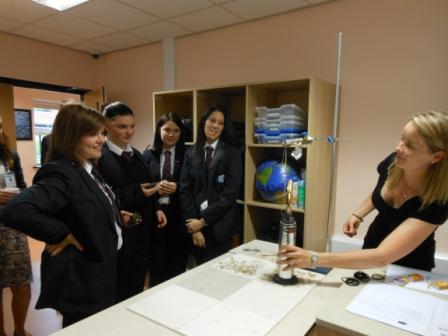 Earlier this term the National Space Academy supported a Girls in Physics event. Students who took part in the event were asked to write a report on the day. The following is the first of two winning reports written for this website by the girls, and was written by Saima Siddiqui from year 11 of the Priory Academy LSST.
Earlier this term the National Space Academy supported a Girls in Physics event. Students who took part in the event were asked to write a report on the day. The following is the first of two winning reports written for this website by the girls, and was written by Saima Siddiqui from year 11 of the Priory Academy LSST.
"On Wednesday 11th September, Mrs Rowsell arranged for an event to be held at the Priory Academy LSST, which was designed to encourage more young women to consider physics as a career. This event, called 'Girls in Physics', was supported by The Ogden Trust and The Institute of Physics, and 5 schools were invited to participate with a team of four girls, who had to be in Yr 11.
I was one such girl, along with my team: Scarlett, Ellie and Holly. Since I was already very interested in Physics, especially astronomical physics, I jumped at the chance of participating in this event! In hindsight, I'm really glad that I didn't turn up my nose at this fantastic opportunity, as it was such an amazing afternoon! The event started with a workshop, in which we solved an AS-level calculation – considerably boosting our confidence – and then this led on to the main part of the project.
None of us really knew what it was we were doing until we turned up on the afternoon, but we were all buzzed to be re-living our Physics knowledge. Since all four of us were separate scientists, we had finished our GCSEs a year early, and hadn't done any Physics in a while. But, having done the entire course, we thought that perhaps we might be at a slight advantage – this turned out not to be the case!
We soon found out that we would have to rely on our logic and not-so-advanced engineering skills, in order to create a prototype thermal protection system, or 'heat shield', for a vehicle re-entering Earth's atmosphere, which would be tested at the end of the day against a powerful flame, to see how long it lasted. Of course, this just reaffirmed to us that Space Physics is an applied subject, and much of it is about what works in practice: what we thought might work in theory, was not necessarily what worked best in reality.
But this learning step just heightened our determination and boosted our morale: we were going to do this, and we were going to do this well! Our first attempted prototype was very successful and managed to last almost 6 minutes, higher than any other team's! If only we had been able to maintain that level of achievement!
Alas, another schools' team beat us very narrowly (by 8 minutes); theirs lasting 15 minutes while ours lasted 7. Nevertheless, we came third, which we were proud of, since the competition was very tough. All the other teams worked very hard and, although nobody even touched the winning 15 minutes, all other prototypes lasted around 5-7 minutes.
During this amazing afternoon, each team also got the chance to work closely in collaboration with a female Yr 13 student, who had taken Physics at A-level. This allowed everybody the chance to ask questions and find out more about what it was like to study the subject and what the potential advantages of studying it were. There are currently very few women who choose to study Physics beyond GCSE, and the Ogden Trust used this event to try to encourage able young women that Physics would be a worthwhile option.
In the end, we all got so carried away, that we even exceeded the time that we were supposed to finish at, by 15 minutes! I can safely say that it was the most fun I've had in a while, and (although I was already going to study A-level Physics,) this event has cemented my decision!"
Many thanks to Saima for submitting this lively and personal report

